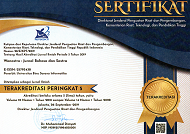INFLUENCE OF EMOTIONAL INTELLIGENCE AND TEACHING METHOD TOWARDS LISTENING SKILL
Abstract
The aim of the research is to know the effect of teaching method and emotional intelligence towards student’s listening skill. The writer applied the purpose sampling to determine the sample. The technique of collecting data of teaching method and emotional intelligence used Likert scales or questioners and the Listening Skill test was acquired from the test multiple choice of 20 items. The research methodology that is used explanatory experimental and technique of data analysis that used in this research is regression analysis model. It was used to know the effect of independent variable to dependent variable. The statistic test used t-test and data analysis used correlation technique and partial regression. The research findings are:1). There is effect of Teaching Method towards Student’s Listening Skill. The result of the research is obtained by sig value = 0.000 < 0.05. It means that there is significance different of Student’s Listening Skill of the students who are taught by audio lingual teaching method and Student’s Listening Skill who are taught by conventional method. 2). There is effect of Emotional intelligence towards Student’s Listening Skill. The result of the test is obtained by sig value = 0.000 < 0.05. It means that there is significance difference of Student’s Listening Skill of the students whose High Emotional intelligence with Student’s Listening Skill of the students whose Low Emotional intelligence. 3). There is interaction between Teaching Method and Emotional intelligence towards Student’s Listening Skill at Private Junior High School in South Jakarta. The result of the test is obtained by sig value = 0.043 < 0.05.
Full Text:
PDFReferences
Arikunto, Suharsimi. (1992). Prosedur Penelitian Suatu Pendekatan Praktik. Jakarta: Rineka Cipta.
Bloom, Benyamin. (1997). Taxonomy of Educational Objective Cognitive Domain. New York: David Mc kay Company.
Brown, H. Douglas. (2007). Teaching by Principles. An Interactive Approach to Language Pedagogy. New York, USA: Pearson Education, Inc.
Cooper, Robert K., and Ayman Sawaf. (1997). Executive EQ Emotional Intelligence in Leadership and Organizations. New York: The Berkley Publishing Group.
Fleetham, Mike. (2006). Multiple Intelligence in Practice – Enhancing Self-Esteem and learning in the classroom. Great Britain: New York.
Gagne, Robert M. and Leslie J. Briggs. (1979). Principles of Instructional Design, Second Edition. New York: Holt, Rinehart, and Winston.
Gardner, Howard. (1983). Frames of Mind: The Theory of Multiple Intelligences. New York: Basic Books
Gardner, Howard. (1999). Intelligence Reframed, Multiple Intelligence for the 21st Century. New York: Basic Books.
Goleman, Daniel. (2009). Emotional Intelligence: Why it can matter more than IQ. Bloomsbury: Great Britain
Harmer, Jeremy. (1998). How to teach English. England: Addison Wesley Longman limited.
Hartel, Charmine E.J. et al. Emotions in Organizational Behavior. Lawrence Erlbaum Associates. Publishers: London
Helgesen, Brown, and Nunan. (2007). Practical English Language Teaching; Listening. New York. USA: McGraw-Hill Companies, Inc.
Hornby, AS. (1987). Oxford Advanced learners Dictionary of Current English. Britain: Oxford University.
L.R. Gay and Peter Airasian. (2000). Educational Research: competencies for analysis and aplication-6th ed. USA: Merryl Prentice Hall
Lynn, Adele B. (2000). 50 Activities for Developing Emotional Intelligence. Massachusetts: HRD Press, Inc.
Mayer, J.D., Barsade, S.G., & Roberts, R.D. (2008). Human Abilities: Emotional Intelligence. Annual Review of Psychology.
Mayer, J.D., Salovey, Peter, Caruso, David R. (2008). Emotional Intelligence: New ability or eclectic Traits? American Psychologist.
Murcia, Marianne C. and Diane, Larsen F. 1999. The Grammar Book. An ESL? EFL Teacher’s Course Second Edition. USA: Heinle & Heinle Publisher.
Nation, I.S.P. and Newton, J. 2009. Teaching ESL/EFL Listening and Speaking. New York: Routledge.
Nunan, David. 1998. The Center Curriculum. Cambridge: Cambridge University Press.
Richard, Jack C and Willy A. Renandya. 2002. Methodology in Language Teaching An Anthology of Current Practice. Cambridge University Press.
Richards, Jack C. and Theodore S. Rodgers. 2003. Approaches and Methods in Language Teaching. Cambridge University Press.
Robin, J. 2000. The Contribution of Video to The Development of Competence in Listening. In D.J. Mendelshon & J. Robin (Eds), A guide for the teaching of second language listening (pp. 151-165). San Diego, CA: Dominie Press.
Rost, M. 2011. Teaching and Researching Listening. United Kingdom: Pearson Education Limited.
Salovey, P, Mayer, J.D. 1990. Emotional Intelligence: Imagination, Cognition, and Personality.
Sudjana, Nana. 1996. Metode statistika. Bandung: Tarsito
Thomas, Armstrong. 2000. Multiple Intelligences in the Classroom. Virginia: Association for Supervision and Curriculum Development.
Wilson, JJ. 2008. How to teach Listening. England: Pearson Education, Inc.
Zeidner, Moshe et al. 2009. What We Know About Emotional Intelligence. Massachusetts: The MIT Press.
JOURNAL:
Dutta, Sukhendu. 2010. Conventional Teaching in Basic Science: An inner view. India: Department of Anatomy, sri Guru Ram Rai Institute of Medical & Health Science Patel Nagar, Dehradun-248001 Uttarakhand
ARTICLE:
Public Agenda. 2005. Teaching Mehtods: A Public Agenda Citizen Choicework Guide (for community conversations, classroom, study groups and individuals). New York
DOI: https://doi.org/10.31294/w.v7i1.763
Copyright (c) 2016 Ary Iswanto

This work is licensed under a Creative Commons Attribution-ShareAlike 4.0 International License.
Index by:
Published by Department of Research and Community Service (LPPM) Universitas Bina Sarana Informatika by supported Relawan Jurnal Indonesia
Jl. Kramat Raya No.98, Kwitang, Kec. Senen, Jakarta Pusat, DKI Jakarta 10450

This work is licensed under a Creative Commons Attribution-ShareAlike 4.0 International License






